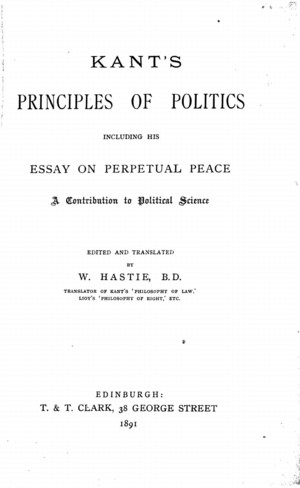
Kant’s Principles of Politics, including his essay on Perpetual Peace
- Immanuel Kant (author)
- William Hastie (translator)
This 1891 translation includes a number of Kant’s shorter pieces on Universal History, Political Right, Principle of Progress, and Perpetual Peace.
Key Quotes
Liberty
No one has a right to compel me to be happy in the peculiar way in which he may think of the well-being of other men; but everyone is entitled to seek his own happiness in the way that seems to him best, if it does not infringe the liberty of others in striving after a similar end for themselves…